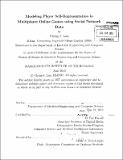Modeling player self-representation in multiplayer online games using social network data
Author(s)
Lim, Chong-U
DownloadFull printable version (8.885Mb)
Other Contributors
Massachusetts Institute of Technology. Department of Electrical Engineering and Computer Science.
Advisor
D. Fox Harrell.
Terms of use
Metadata
Show full item recordAbstract
Game players express values related to self-expression through various means such as avatar customization, gameplay style, and interactions with other players. Multiplayer online games are now often integrated with social networks that provide social contexts in which player-to-player interactions take place, such as conversation and trading of virtual items. Building upon a theoretical framework based in machine learning and cognitive science, I present results from a novel approach to modeling and analyzing player values in terms of both preferences in avatar customization and patterns in social network use. To facilitate this work, I developed the Steam-Player- Preference Analyzer (Steam-PPA) system, which performs advanced data collection on publicly available social networking profile information. The primary contribution of this thesis is the AIR Toolkit Status Performance Classifier (AIR-SPC), which uses machine learning techniques including k-means clustering, natural language processing (NLP), and support vector machines (SVM) to perform inference on the data. As an initial case study, I use Steam-PPA to collect gameplay and avatar customization information from players in the popular, and commercially successful, multi-player first-person-shooter game Team Fortress 2 (TF2). Next, I use AIR-SPC to analyze the information from profiles on the social network Steam. The upshot is that I use social networking information to predict the likelihood of players customizing their profile in several ways associated with the monetary values of their avatars. In this manner I have developed a computational model of aspects of players' digital social identity capable of predicting specific values in terms of preferences exhibited within a virtual game-world.
Description
Thesis (S.M.)--Massachusetts Institute of Technology, Dept. of Electrical Engineering and Computer Science, 2013. Cataloged from PDF version of thesis. Includes bibliographical references (p. 101-105).
Date issued
2013Department
Massachusetts Institute of Technology. Department of Electrical Engineering and Computer SciencePublisher
Massachusetts Institute of Technology
Keywords
Electrical Engineering and Computer Science.